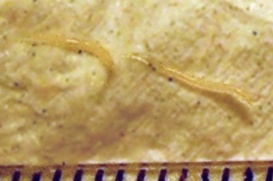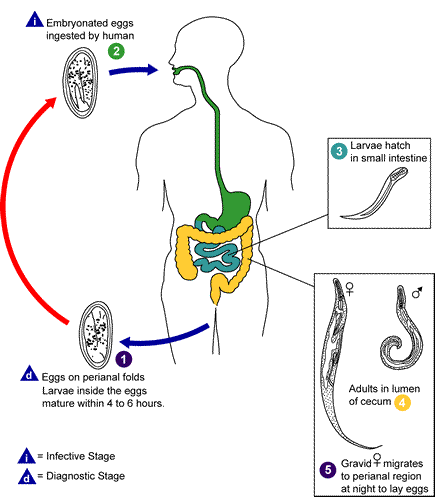Pinworm Infection
Pinworm infection, also known as threadworm infection in the UK, or enterobiasis, is caused by the parasitic worm Enterobius vermicularis.
This condition is common worldwide and is particularly prevalent among school-aged children. The infection is characterised by itching in the anal area, which is caused by the female pinworms laying eggs around the anus.
Signs and Symptoms

One-third of individuals with pinworm infection are asymptomatic. The primary symptom is itching around the anus and perineum, especially at night. This itching is caused by the female pinworms migrating to lay eggs. The irritation can lead to scratching, which may cause skin tears and secondary bacterial infections.
Other symptoms include trouble sleeping, restlessness, loss of appetite, weight loss, irritability, emotional instability, and bed-wetting. In females, pinworms can migrate to the vulva and vagina, causing inflammation and possibly urinary tract infections.
Cause

Pinworm infection is caused by the ingestion of Enterobius vermicularis eggs. The lifecycle of the pinworm takes place entirely within the human gastrointestinal tract. After being swallowed, the eggs hatch in the small intestine, and the larvae grow and migrate to the colon. Female pinworms lay eggs around the anus, causing itching and facilitating the spread of the infection.
Diagnosis

Diagnosis is based on finding the eggs or adult pinworms. This can be done by visually inspecting the anal area, especially at night, or using transparent adhesive tape to collect eggs from the anal area for microscopic examination. Examining samples from under the fingernails can also be useful. Routine stool examination is generally ineffective as pinworms do not lay eggs in faeces.
Prevention
Preventing pinworm infection involves good personal hygiene and cleanliness. Key measures include:
- Keeping fingernails short
- Regular handwashing, particularly after defecation and before meals
- Daily morning showers to remove any eggs on the skin
- Changing bed linens, sleeping garments, and towels daily
- Avoiding the shaking of clothes and bed linens to prevent the spread of eggs
Regular disinfection of kitchen and bathroom surfaces can also help reduce the risk of infection. Children should avoid nail-biting and sucking on fingers, and wearing gloves while sleeping can minimise reinfection.
Treatment
Treatment primarily involves medication, often requiring repeated doses to ensure complete eradication of the parasite. Common medications include mebendazole, albendazole, and pyrantel pamoate. These drugs are effective but reinfection is common, necessitating treatment of all household members regardless of symptom presence.
Treatment in Pregnancy and Breastfeeding
During pregnancy, treatment is recommended only for symptomatic cases due to the limited data on the safety of these medications. Pyrantel pamoate is the preferred choice, particularly in the second and third trimesters. Mebendazole is considered compatible with breastfeeding, while pyrantel pamoate and albendazole are also deemed safe due to minimal systemic absorption.
Epidemiology
Pinworm infection is the most common helminth infection in the United States and Western Europe, with a significant prevalence among children. The infection is not associated with any specific social class, race, or culture, and it often occurs in all members of a household due to its ease of transmission.
History
Pinworm infection dates back to ancient times, with evidence found in coprolite dating to 7837 BC. Historical treatments include the use of garlic, recommended by ancient cultures and notable figures like Hippocrates and Adam Lonicer.
Self-assessment MCQs (single best answer)
What is another name for pinworm infection in the UK?
Which age group is most commonly affected by pinworm infection?
What is the primary symptom of pinworm infection?
How is pinworm infection primarily transmitted?
Which method is ineffective for diagnosing pinworm infection?
What is a key preventive measure against pinworm infection?
What is the preferred medication for treating pinworm infection during the second and third trimesters of pregnancy?
What historical figure recommended the use of garlic to treat pinworm infection?
Which of the following is NOT a symptom associated with pinworm infection?
Where do female pinworms lay their eggs?
Dentaljuce
Dentaljuce provides Enhanced Continuing Professional Development (CPD) with GDC-approved Certificates for dental professionals worldwide.
Founded in 2009 by the award-winning Masters team from the School of Dentistry at the University of Birmingham, Dentaljuce has established itself as the leading platform for online CPD.
With over 100 high-quality online courses available for a single annual membership fee, Dentaljuce offers comprehensive e-learning designed for busy dental professionals.
The courses cover a complete range of topics, from clinical skills to patient communication, and are suitable for dentists, nurses, hygienists, therapists, students, and practice managers.
Dentaljuce features Dr. Aiden, a dentally trained AI-powered personal tutor available 24/7 to assist with queries and provide guidance through complex topics, enhancing the learning experience.
Check out our range of courses, or sign up now!


